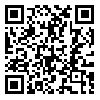Volume 1402, Issue 1 (5-2023)
2023, 1402(1): 0-0 |
Back to browse issues page
Ethics code: IR.MEDILAM.REC.1400.123
Download citation:
BibTeX | RIS | EndNote | Medlars | ProCite | Reference Manager | RefWorks
Send citation to:



BibTeX | RIS | EndNote | Medlars | ProCite | Reference Manager | RefWorks
Send citation to:
Otaghi M, Mozafari M, Veisani Y, Taher A. Investigating the relationship between moral intelligence, moral reasoning and clinical competence of nurses in teaching hospitals in Ilam in 2021. Journal title 2023; 1402 (1)
URL: http://newresearch.medilam.ac.ir/article-1-1625-en.html
URL: http://newresearch.medilam.ac.ir/article-1-1625-en.html
Department of Nursing, School of Nursing and Midwifery, Ilam University of Medical sciences, Ilam, Iran
Abstract: (2011 Views)
This proposal has no abstract.
Received: 2021/09/16 | Accepted: 2021/10/2 | Published: 2023/05/31
Send email to the proposal executer
| Rights and permissions | |
 | This work is licensed under a Creative Commons Attribution-NonCommercial 4.0 International License. |






